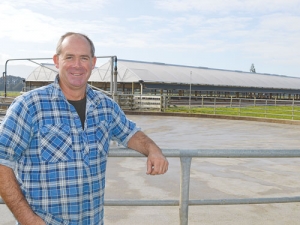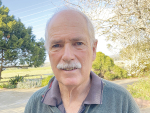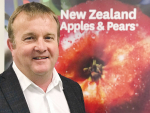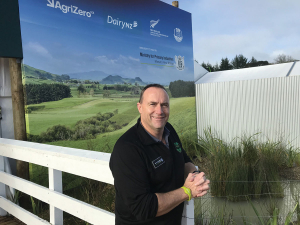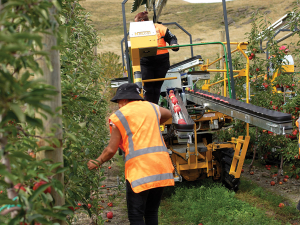Last year's drought and this season’s low milk payout haven’t changed anything on Rex Butterworth’s dairy farm in Waikato.
Like every other season, Butterworth monitors every dollar spent on the farm and there is no cutting back on essential farm inputs.
This season the Matamata farmer will be producing 19% more milk than last season, which finished 32% ahead of the earlier season; his cost of production has dropped to $2.93/kgMS this season compared to $3.11/kgMS last season.
Butterworth is tired of the doom and gloom enveloping the dairy industry; the payout and weather are beyond his control but farm management practices aren’t, he points out.
Three years ago Butterworth invested in Herd Homes shelters. The $1 million investment includes two 250-cow shelters; the second shelter was completed 18 months ago.
He says the Herd Homes shelters have helped lift production strongly two consecutive seasons. While there are 8% more cows this season, good cow condition from the previous season lifted milk yield.
“We have carried better cow condition through from last season, so our start point cow condition was better; we managed to maintain that and improve on it,” he told Dairy News.
A good feed regime is the key to keeping cows in condition; the Herd Homes shelters allow him to efficiently feed his cows. Each cow eats a tonne of maize and PKE, with grass silage also fed regularly.
Butterworth says without the shelters he would have been struggling, like some other farmers.
“That’s why we built them in the first place – to try to get some consistency into our business and it has done that. We’ve seen a marked improvement in cow condition. Previously we have been gaining and losing cow condition; now there’s a net gain all the way. I expect production to increase further in cow condition alone.”
Completing his second season with two Herd Homes shelters, Butterworth says he’s “learning the system better and better”.
The farm has a 100ha milking platform, running 480 cows. Milk production is expected to top 242,000kgMS this season. He plans to milk the late calvers through late May, taking advantage of good grass growth.
Butterworth supplies Fonterra and sees the low milk payout of $4.70/kgMS as a worry.
“It means we have to monitor everything very carefully.
“Before we spend any money on feed or make any capital expenditure, we run it through our budget first, to make sure it won’t create an issue further down the track. But we have been doing that every year.
“So, I guess in many ways we haven’t changed anything in that respect because that’s what we do anyhow.”
With milk payout down, Butterworth has cut back spending on “luxury items”. “But we are not cutting back on essentials; if we do take anything out of the system, we’ve got to make sure it doesn’t have a negative impact down the path.”
Recently Butterworth was offered 100 tonnes of good quality maize from a nearby farm at a very good price. He engaged farm analysis consultants Red Sky to go through his farm numbers and advise whether the maize purchase was advisable.
He bought the maize and has stored it for use in winter. “It means security for next season and I won’t be any worse off by doing it – taking advantage of cheap quality feed and put it in the bank so to speak.”
Red Sky also reported that his return on capital (ROC) with one Herd Homes shelter three seasons ago was 5.9%; last year with the record payout and two Herd Homes shelters the farm achieved a 10% ROC. This season Butterworth is on track for a 4.6% ROC despite the low payout; most farmers will be in the 2% to -2% range.
Butterworth says there is much to achieve with the two Herd Homes shelters.
“I wish I had done this much earlier – 10 years ago. With the shelters, we are still doing the same… we haven’t taken anything out of the system but our milk production is higher and our returns are climbing.”
Cows spend most of their days in the shelters and most of their nights outside; there is no overgrazing of pastures.
“Last year I noticed how quickly pasture recovered after the drought, this year’s pastures are better and have come back stronger.”





